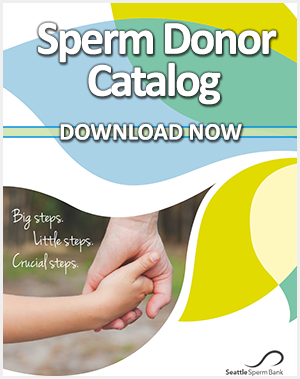Seattle Sperm Bank is your trusted partner and resource when it comes to donor sperm. We are here every step of the way as your journey into parenthood. Explore our blog for topics from preconception to conception with donor sperm.

Donor Sperm: A Single Parent By Choice Tells Her Story
At Seattle Sperm Bank, we proudly support all the paths that lead to parenthood. Single parenthood by choice is a growing group of people that are choosing to become parents without a co-partner. We are grateful to have Kristin share her experience about choosing to be a single parent by choice and what the journey to parenthood looked like for her. Kristin, how did you make the decision to pursue parenthood alone? Did you have any fears going into this as a single parent? "I had thought about...

Your Timeline for Ordering Donor Sperm
Starting your journey to parenthood using donor sperm is an exciting time, but when it comes to choosing, ordering, and scheduling, it can start to be overwhelming. We are here to guide you step by step through the donor sperm process, from choosing a donor to submitting a birth report. Choosing Your Sperm Donor Starting your donor search early is the best way to tackle this step. Giving yourself more time to find your favorite donor helps ease some of the stress of looking. New donors are...

The LGBTQIA Guide To Donor Sperm
Seattle Sperm Bank Is Proud To Support The LGBTQIA+ Community Getting started with family planning can be an exciting time but looking for the right donor sperm can feel like a big undertaking, along with any other treatment needed to pursue parenthood. Using compassionate care and one-on-one assistance, we are ready to support your family-building goals. Here are some tips for getting started and finding your favorite donor: Start With Your Healthcare Professional Whether your road to...

Tips and Tricks To Find The Right Sperm Donor
Congratulations! You’re taking your first steps to parenthood. Whether you always knew you would need a donor, or it just became part of your journey, we understand it can feel overwhelming. Parenthood with donor sperm can mean you are doing this with or without a partner, but we are here to be by your side every step of the way. To help you get started, we’ve put together some inside tips and tricks that we have learned for finding your perfect donor! Start With A List Making a list of...

Unvaccinated Vs. Vaccinated Donor Sperm
When looking for donor sperm there are numerous characteristics to keep in mind, and on the top of the list is quality and health. The recent Covid pandemic and Covid vaccinations may leave you wondering about unvaxxed sperm versus vaccinated sperm. Where does the data stand today? At Seattle Sperm Bank we keep a close eye on the latest information regarding donor sperm regulations and requirements. We know that active Covid infections can be detrimental to overall health, which is important...

Natural Ways To Increase Fertility
Trying to conceive can be an overwhelming task, but you are not alone! We are sharing some of our top recommendations from within the industry to help put an action plan together for yourself and improve your chances of pregnancy. Tracking Your Ovulation If you’re not already doing this, grabbing an ovulation prediction kit is a great place to start! Understanding your own cycle is a key factor when trying to conceive. The goal is to identify when you’re most fertile, known most commonly as...

We Tried It! At-Home Tests for Tracking Fertility
When trying to conceive (or TTC), there can be an overwhelming amount of information to take in. A great place to start is to better understand your best days for conceiving with ovulation predictor kits (OPK). And pregnancy tests are also great to have on hand! OPKs work by testing amounts of luteinizing hormone (LH), estrogen, or a combination of both. Both hormones fluctuate during the month and an increase is an indicator of pending ovulation. Pregnancy tests look for human chorionic...
Tips for Tracking Ovulation
When trying to conceive, understanding your ovulation cycle can be an important first step. Unless you have a known infertility issue, this awareness can help increase your chance of getting pregnant in less time. Whatever method you use to track your fertility, each is designed to tell you the days when you’re most fertile, and therefore, the best days to attempt insemination. This is known as your “fertility window,” which includes the five days leading up to ovulation, when you have the...

Fertility Questions to Ask Your Gynecologist
Whether you are currently trying to conceive, or pregnancy is part of your long-term plan, there are many good reasons to talk about fertility with your gynecologist or health care provider. If this sparks some anxiety, you’re not alone. Many women are reluctant to talk about certain sensitive issues with a doctor. But having this conversation can be an important part of a healthy pregnancy. If you do decide to make an appointment, we suggest you mention it ahead of time so your care provider...

Do Fertility Treatments Increase the Risk of Breast Cancer?
The results of a recently released meta-analysis found no links between fertility treatments and breast cancer. These findings were published online in the medical journal Fertility and Sterility on June 21, 2021. A meta-analysis is a type of study that combines and analyzes the results of various earlier studies. In this case, the researchers reviewed 20 studies focused on whether drugs that stimulate the ovaries to release eggs also increased the risk of breast cancer. The patients studied...

